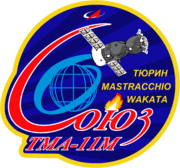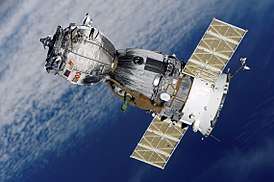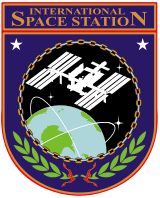Soyuz TMA-11M
 Soyuz TMA-11M docked at the ISS (center) | |
| Mission type | ISS crew transport |
|---|---|
| Operator | Roskosmos |
| COSPAR ID | 2013-061A |
| SATCAT no. | 39373 |
| Mission duration | 187 days, 21 hours, 44 minutes |
| Spacecraft properties | |
| Spacecraft | Soyuz 11F732A47 No.711 |
| Spacecraft type | Soyuz-TMA 11F747 |
| Manufacturer | RKK Energia |
| Crew | |
| Crew size | 3 |
| Members |
Mikhail Tyurin Richard Mastracchio Koichi Wakata |
| Callsign | Vostok |
| Start of mission | |
| Launch date | 7 November 2013, 04:14:15 UTC[1] |
| Rocket | Soyuz-FG |
| Launch site | Baikonur 1/5 |
| End of mission | |
| Landing date | 14 May 2014, 01:58 UTC |
| Orbital parameters | |
| Reference system | Geocentric |
| Regime | Low Earth |
| Docking with ISS | |
| Docking port | Rassvet nadir |
| Docking date | 7 November 2013, 10:27 UTC |
| Undocking date | 13 May 2014, 22:36 UTC |
| Time docked | 187 days, 12 hours, 9 minutes |
|
 (l-r) Wakata, Tyurin and Mastracchio Soyuz programme (Manned missions) | |
Soyuz TMA-11M was a 2013 flight to the International Space Station. It transported three members of the Expedition 38 crew to the International Space Station. TMA-11M is the 120th flight of a Soyuz spacecraft, with the first flight launching in 1967. The successful docking of the Soyuz TMA-11M spacecraft on November 7, 2013 marked the first time since October 2009 that nine people have resided on the space station without the presence of a space shuttle.
The rocket and spacecraft applied Olympic symbols on the cowl of the ship. During mission, the Olympic torch has been passed for the first time in open space, Russian cosmonauts Oleg Kotov and Sergey Ryazansky passed it at the outlet of the International Space Station.
Crew
| Position[2] | Crew Member | |
|---|---|---|
| Commander | Expedition 38 Third and last spaceflight | |
| Flight Engineer 1 | Expedition 38 Fourth and last spaceflight | |
| Flight Engineer 2 | Expedition 38 Fourth spaceflight | |
Backup crew
| Position[3] | Crew Member | |
|---|---|---|
| Commander | ||
| Flight Engineer 1 | ||
| Flight Engineer 2 | ||
Cargo
TMA-11M carried the Olympic flame for the 2014 Winter Olympics into space for the first time.[4] The torch returned to Earth 5 days later on board TMA-09M.
.jpg)
Gallery
.jpg) Rocket with the logo of the Sochi Olympics
Rocket with the logo of the Sochi Olympics.jpg) Close-up view of Soyuz capsule adorned with the Sochi Olympics logo
Close-up view of Soyuz capsule adorned with the Sochi Olympics logo Soyuz TMA-11M crew members with the 2014 Olympic torch
Soyuz TMA-11M crew members with the 2014 Olympic torch
References
| Wikimedia Commons has media related to Soyuz TMA-11M. |
- ↑ NASA. "Consolidated Launch Manifest". NASA. Retrieved June 6, 2011.
- ↑ JAXA. "Astronaut Koichi Wakata Selected as Member of ISS Expedition Crew". Retrieved 2011-02-17.
- ↑ astronaut.ru (2013). "Орбитальные полёты".
- ↑ "Sochi 2014 Flame lit in Olympia kicking off record-breaking torch relay". Russia Today.


